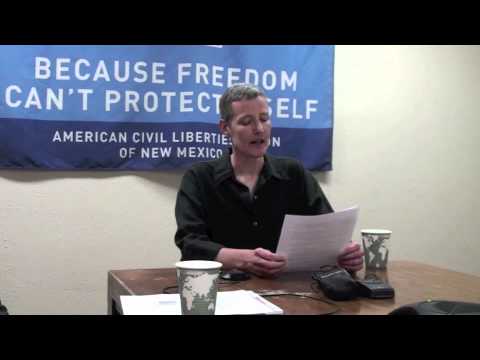“Why are some people so aghast at the idea that when we vote we should have to show a photo ID?”
This is the question that Diane Dimond poses in her recent column supporting mandatory photo ID for voting. If Ms. Dimond is sincere in her desire to understand why people would oppose this wrong-headed scheme, she should direct her question to Albuquerque voter Katy Sheridan. Katy is a retired grandmother of two and has been a voter for the past 49 years. It is a responsibility she takes seriously.
“It’s my voice, it’s one of the ways I can make an impact on the direction my country goes,” Katy told the ACLU of New Mexico in a recent video interview.
On October 4, 2011, Katy set out to make her voice heard in the Albuquerque municipal elections. The day was stormy, but Katy—who does not own a car—braved the weather and walked through the wind and the rain to her polling place to cast her vote. There poll workers turned her away because she did not have a government issued photo ID with her.
The truth is that unnecessary and expensive photo ID laws, like the one in Albuquerque, have nothing to do with improving elections. These laws are specifically designed to make it harder for qualified American citizens like Katy Sheridan to vote. We are living through a troubling new era in our nation’s history characterized by renewed efforts to strip American citizens of their right to vote.
Why are we aghast? Because these mandatory photo ID laws are nothing more than a 21st century poll tax. Poll taxes and “literacy tests” were used in the Jim Crow south to prevent African Americans from exercising their right to vote. We now find these tactics abhorrent and shameful, but let us not forget that many people thought them perfectly reasonable at the time: Why shouldn’t a person have to be literate to vote? Do we really want anyone voting who can’t afford a measly one-dollar fee? You have to show an photo ID for all sorts of things today, why not voting?
Voting is not a privilege, it is a constitutional right, and no eligible citizen should have to pay to vote. Government issued photo IDs cost money and obtaining copies of birth certificates, passports or other required supporting documents can be expensive as well--sometimes running upwards of hundreds of dollars. This modern day poll tax burdens the citizens who are least able to afford it: people like the elderly who live on a fixed income and rural voters who live many miles from the nearest MVD.
Mandatory photo ID laws are the centerpiece in this new generation of vote suppression efforts, but such laws are only one tactic among many designed to make it harder for Americans to vote. In recent years, we’ve also seen efforts to suppress early voting and block civic groups like the League of Women Voters from registering new voters.
Voter participation and turnout is a key measure of the health of our democracy. American voter turnout is substantially lower than most other established democracies, rarely rising above 50 percent. Shouldn’t we work to reduce unnecessary barriers to voting, not make it harder? Shouldn’t we strive to ensure every eligible citizen has his or her voice heard?
Date
Tuesday, April 3, 2012 - 11:49amFeatured image







